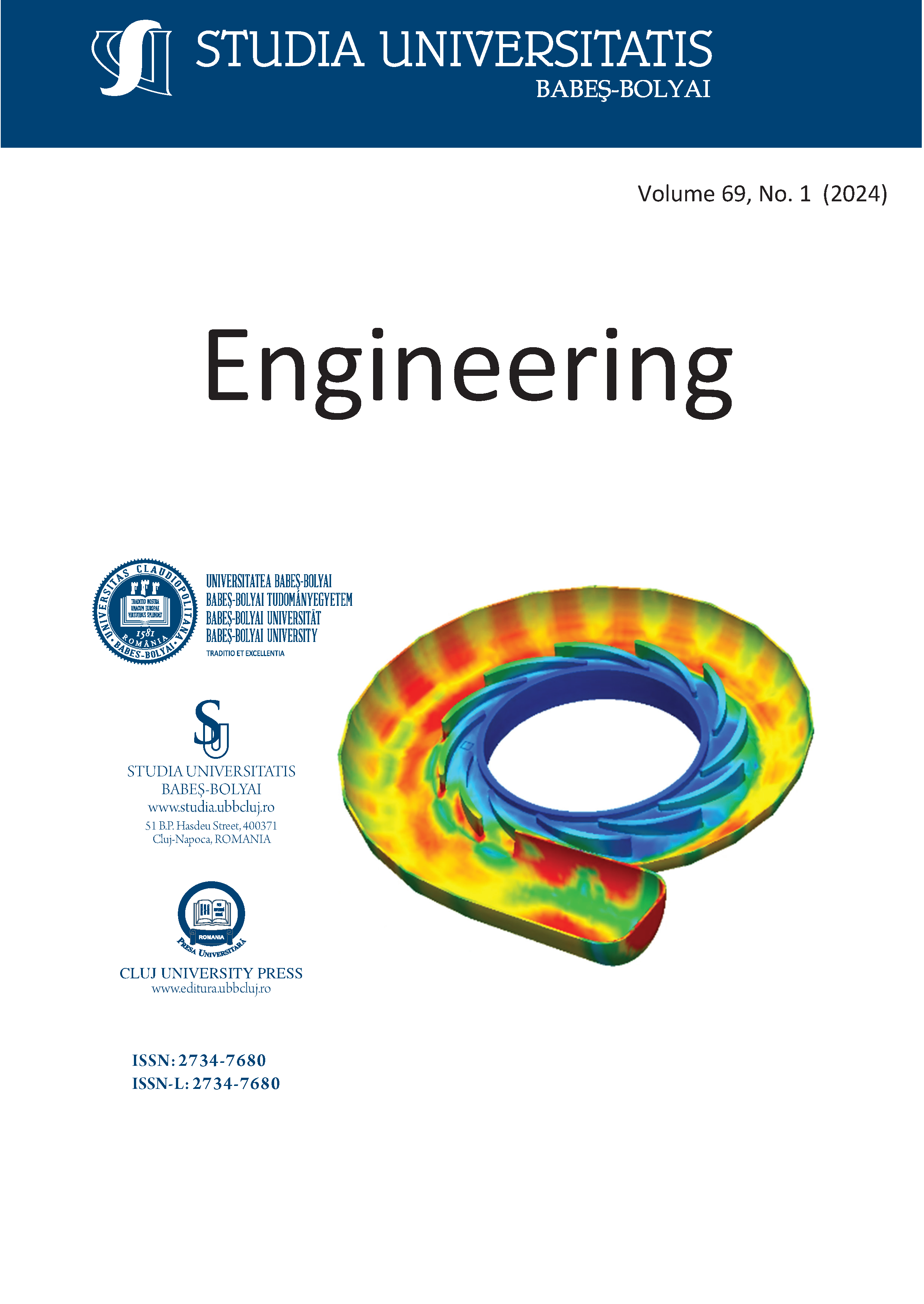The effect of the signal initial phase on the amplitudes of a DFT spectrum
DOI:
https://doi.org/10.24193/subbeng.2024.1.10Keywords:
Discrete Fourier Transform, amplitude spectrum, frequency estimation, initial phaseAbstract
Knowing the amplitudes in a spectrum calculated using the Discrete Fourier Transform (DFT) algorithm is essential for precisely estimating the frequencies of a real-valued signal. Since the amplitudes are affected by the signal's initial phase, it is crucial to consider this aspect when estimating the signal frequencies. This paper presents the initial signal phase's effect on the values calculated for the real and imaginary parts and the magnitudes in the DFT of a real-valued signal. Analyzing the evolution of the amplitudes with the initial phase for a complete cycle for the initial phase, we found that the values in the magnitude DFT are subject to minor alteration, while the values of the real and imaginary parts of the DFT are strongly affected by the initial phase.
References
I. Santamaria, C. Pantaleon, J. Ibanez, A comparative study of high-accuracy frequency estimation methods, Mechanical Systems and Signal Processing, 14(5), 2000, pp. 819-834.
A.A. Minda, C.I. Barbinita, G.R. Gillich, A Review of Interpolation Methods Used for Frequency Estimation, Romanian Journal of Acoustics and Vibration, 17(1), 2020, pp. 21-26.
B.G. Quinn, Estimating Frequency by Interpolation Using Fourier Coefficients, IEEE Transactions on Signal Processing, 42, 1994, pp. 1264-1268.
E. Jacobsen, P. Kootsookos, Fast, accurate frequency estimators, IEEE Signal Processing Magazine, 24(3), 2007, pp. 123-125.
C.Candan, A method for fine resolution frequency estimation from three DFT samples, IEEE Signal Processing Letters, 18(6), 2011, pp. 351-354.
J.L Ntakpe, G.R. Gillich, I.C. Mituletu, Z.I. Praisach, N. Gillich, An Accurate Frequency Estimation Algorithm with Application in Modal Analysis, Romanian Journal of Acoustics and Vibration, 13(2), 2016, pp. 98-103.
T. Grandke, Interpolation Algorithms for Discrete Fourier Transforms of Weighted Signals, IEEE Transactions on Instrumentation and Measurement, 32, 1983, pp. 350-355.
P. Voglewede, Parabola approximation for peak determination, Global DSP Magazine, 3(5), 2004, pp. 13-17.
V.K. Jain, W.L. Collins, D.C. Davis, High-Accuracy Analog Measurements via Interpolated FFT, IEEE Transactions on Instrumentation and Measurement, 28, 1979, pp. 113-122.
G.R. Gillich, I.C. Mituletu, Z.I. Praisach, I. Negru, M. Tufoi, Method to Enhance the Frequency Readability for Detecting Incipient Structural Damage, Iranian Journal of Science and Technology, Transactions of Mechanical Engineering, 41(3), 2017, pp. 233–242.
E. Aboutanios, B. Mulgrew, Iterative frequency estimation by interpolation on Fourier coefficients, IEEE Transactions on Signal Processing, 53(4), 2005, pp. 1237-1242.
K. Ding, C. Zheng, Z. Yang, Frequency Estimation Accuracy Analysis and Improvement of Energy Barycenter Correction Method for Discrete Spectrum, Journal of Mechanical Engineering, 46(5), 2010, pp. 43-48.
J.Z. Xiang, S. Qing, C. Wei, A novel single tone frequency estimation by interpolation using DFT samples with zeropadding, in: Proc. IEEE ICSP, Chengdu, China, Mar. 2017, pp. 277-281.
C. Tufisi, A.A. Minda, D.G. Burtea, G.R. Gillich, Frequency Estimation using Spectral Techniques with the Support of a Deep Learning Method, Romanian Journal of Acoustics and Vibration, 19(1), 2022, pp. 49-55.
D.G. Burtea, G.R. Gillich, C. Tufisi, Estimating the frequencies of vibration signals using a machine learning algorithm with explained predictions, Vibroengineering Procedia, 51, 2023, pp. 160-166.
D.G. Burtea, E.V. Gillich, C. Tufisi, Tudor L., Estimation of The Frequency of Very Short Signals by Involving Artificial Neural Networks, Romanian Journal of Acoustics and Vibration, 20(2), 2023, pp. 157-161
Downloads
Published
How to Cite
Issue
Section
License
Copyright (c) 2024 Studia Universitatis Babeș-Bolyai Engineering

This work is licensed under a Creative Commons Attribution-NonCommercial-NoDerivatives 4.0 International License.





 © Studia Universitatis Babeş-Bolyai Engineering. Published by Babeș-Bolyai University.
© Studia Universitatis Babeş-Bolyai Engineering. Published by Babeș-Bolyai University.